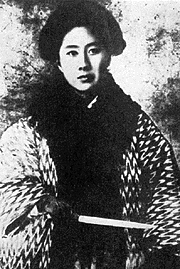Today we pay tribute to the extraordinary Chinese poetess, radical women’s rights leader and revolutionary, Qiu Jin – executed at the age of 31 on this day in 1907. At the turn of the twentieth century, while Qiu’s sisters in the West were crusading for the right to vote, Chinese women in accordance with the I Ching were believed to occupy a lower position than men in the hierarchical order of the universe. Theirs was a lot of bound feet, arranged marriages and subservient positions across every stratum of society. But then along came China’s first feminist. Qiu was the first to attempt to educate, mobilise and emancipate Chinese women as a group, and single-handedly brought the notion of women’s rights to national attention. And without any movement behind her, Qiu Jin said NO to the degradation of bound feet, left her loveless marriage to study in Japan, started her own radical journal calling for Chinese women’s rights and trained a female army of revolutionaries to rise up against the corrupt Qing Dynasty.
Qiu Jin was first exposed to radicalism after her move to Beijing in 1903, where she witnessed the disastrous political and social backlashes from the Boxer Rebellion of 1900-1905. Swept away by the new ideas of a modern republican form of government, Qiu Jin made the bold decision to abandon her husband and two children to become a revolutionary. She pawned her jewellery and made her way to Tokyo, where many radical writers of the time found themselves. She started wearing pants like men, openly advocated for women’s rights and founded a newspaper to denounce foot binding and other practices that subjugated women.
We women, who have had our feet bound from early childhood, have suffered untold pain and misery, for which our parents showed no pity. Under this treatment our faces grew pinched and thin, and our muscles and bones were cramped and distorted. The consequence is that our bodies are weak and incapable of vigorous activity, and in everything we do we are obliged to lean on others … Sisters, let us today investigate the causes which have led to this want of spirit and energy among women. May it not be because we insist on binding up our girls’ feet at an early age, speaking of their “three-inch golden lilies” and their “captivating little steps”?
When Qiu returned to China in 1906, she started a feminist newspaper called Chinese Women, encouraging women to train for work and become financially independent: “The young intellectuals are all chanting, ‘Revolution, Revolution,’ but I say the revolution will have to start in our homes, by achieving equal rights for women.”
Qiu understood the problem of “woman” and “nation” to be inter-connected. Even if the women of China could free themselves from patriarchal rule, it would be of no use as long as China remained subjugated by imperialistic powers. Qiu and her cousin, Hsu His-lin, began working together to unify the various secret revolutionary groups in order to overthrow the Manchu government. She ostensibly opened a school, ostensibly for physical education, but it in truth it was a secret training ground for women revolutionaries.
Plans for a nationwide Chinese uprising were foiled by the premature action of a lone revolutionary cell, prompting swift government retaliation. Deciding to act before government troops could seize him, Qiu’s cousin Hsu assassinated the much-hated governor of Anhui. He was summarily exectuted. Qiu was arrested soon afterwards. Remaining silent even under torture, she was convicted solely on the evidence of two of her revolutionary poems and sentenced to death by public beheading.
Two years later, China’s revolution ignited. Qiu Jin became the first female martyr of the 1911 Revolution and is celebrated today as a national heroine and symbol of women’s independence. In the past half-century, the cause of women’s rights in China has achieved some remarkable results that Qiu would no doubt be proud of. In 1995, the government stated that the realisation of the equality of men and women is a basic national policy to promote social development in China, and Chinese women legally enjoy more equal rights than many women in the West. But the Confucian tradition of man’s superiority over women has largely survived decades of Communist rule, and nowhere is this more evident than in the twisted one-child policy with its consequential forced abortions, female infanticide and gender imbalance. What’s going to happen when 30 million Chinese men can’t find wives? According to a United Nations official: “The shortage of women will have enormous implications on China’s social, economic, and development future … The skewed ratio of men to women will have an impact on the sex industry and human trafficking,” as well as family, societal and regional stability. Verily, Qiu Jin’s legacy and words have never been more pertinent or powerful:
With all my heart I beseech and beg
my two hundred million female compatriots
to assume their responsibility as citizens.
Arise! Arise! Chinese women, arise!



Pingback: Badass Ladies Of Chinese History: Qiu Jin | The World Of Chinese